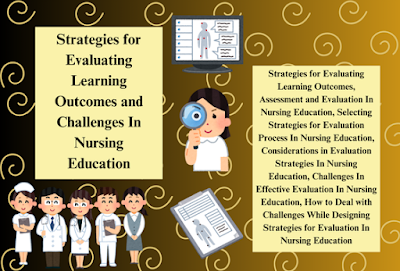The Strategies for Evaluating Learning Outcomes and Challenges In Nursing Education. The practice standard “Assessment” is defined as follows: “The registered nurse assesses progress toward achieving goals and outcomes.” During the assessment, nurses evaluate the patient and compare the results with the initial assessment to determine the effectiveness of interventions and the overall care plan.
The Nursing Education and Strategies for Evaluating Learning Outcomes: Challenges and Solutions
The assessment of learning outcomes in nursing education includes both formative and summative assessments. Formative assessments, such as examinations and peer reviews, provide continuous feedback for improvement. Summative assessments, such as final exams and practical examinations, measure students’ overall competency. Challenges include ensuring the validity and reliability of the assessment and adapting strategies to different learning styles and cultural backgrounds.
Strategies for Evaluating Learning Outcomes in Nursing Education
As nursing education evolves to integrate clinical and classroom instruction, faculty must adapt their evaluation strategies to accurately assess student learning outcomes. These outcomes, aligned with the competencies outlined by the American Association of Colleges of Nursing and the National League for Nursing, require the demonstration of higher-order thinking skills like clinical reasoning and critical thinking.
Multiple evaluation measures are often necessary to effectively gauge these competencies. As educators aim to foster deep learning and reflective practice, they explore ways to align active learning strategies with effective evaluation methods.
Assessment and Evaluation in Nursing Education
Assessment and evaluation, though sometimes used interchangeably, have distinct differences.
- Assessment is the process of collecting information about teaching and learning to enhance student performance. It involves gathering both quantitative and qualitative data, analyzing student work, and providing feedback to promote further learning.
- Evaluation, on the other hand, occurs at the end of a course or program. It involves making judgments based on students’ performance and can be either formative or summative. Formative evaluation occurs during the learning process, providing opportunities for feedback and improvement. Summative evaluation is conducted at the conclusion of a program, determining whether the student has achieved the desired outcomes, often expressed as a grade. Both types of evaluations ensure that nursing graduates are prepared for safe practice.
Selecting Strategies for the Evaluation Process in Nursing Education
Many evaluation strategies can also double as teaching techniques. This allows students to practice the process by which they will be evaluated, bridging the gap between learning and assessment.
Certain strategies are more suited to formative assessment, while others are ideal for summative evaluation. Faculty should carefully select strategies that align with their course goals and objectives.
Considerations in Evaluation Strategies in Nursing Education
When choosing evaluation strategies, faculty should focus on:
- Assessing all domains of learning (cognitive, affective, and psychomotor).
- Addressing higher levels of cognitive skills (e.g., analysis and synthesis).
- Encouraging critical thinking and clinical reasoning.
- Preparing students for licensure or certification exams.
These considerations help ensure that evaluations are comprehensive and aligned with the professional competencies required in nursing practice.
Challenges in Effective Evaluation in Nursing Education
Designing authentic evaluations that closely mimic real-world nursing scenarios provides deeper insights into student achievement. However, several challenges arise when using innovative evaluation strategies:
- Time constraints: Some evaluation methods, like reflective essays or guided writing assignments, require significant time to assess.
- Establishing validity and reliability: Ensuring that evaluation instruments and methods accurately measure the intended learning outcomes can be difficult.
Despite these challenges, evaluations that promote active learning and critical thinking yield richer, more meaningful assessments of student progress.
How to Deal with Challenges While Designing Strategies for Evaluation in Nursing Education
To overcome the challenges associated with evaluation strategies, faculty should:
- Clearly define the purpose of the evaluation: Ensure that the evaluation aligns with course objectives and desired outcomes.
- Consider the setting: Adapt evaluations to both traditional and online learning environments, ensuring that the strategy is appropriate for the context.
- Select the best evaluation strategy: Weigh the advantages and disadvantages of each method, considering factors like time and resources.
- Develop a well-defined procedure: Pilot test evaluation strategies to identify potential issues before full implementation.
- Establish validity and reliability: Use techniques like interpreter reliability to ensure consistent evaluations across different faculty members.
- Continuously assess the process: Regularly evaluate the effectiveness of the chosen strategies and make adjustments as needed to improve the evaluation process.
By addressing these considerations, faculty can design effective, reliable evaluation strategies that enhance student learning and ensure nursing graduates are equipped with the necessary skills for professional practice.
Read More:
https://nurseseducator.com/didactic-and-dialectic-teaching-rationale-for-team-based-learning/
https://nurseseducator.com/high-fidelity-simulation-use-in-nursing-education/
First NCLEX Exam Center In Pakistan From Lahore (Mall of Lahore) to the Global Nursing
Categories of Journals: W, X, Y and Z Category Journal In Nursing Education
AI in Healthcare Content Creation: A Double-Edged Sword and Scary
Social Links:
https://www.facebook.com/nurseseducator/
https://www.instagram.com/nurseseducator/
https://www.pinterest.com/NursesEducator/
https://www.linkedin.com/in/nurseseducator/
https://www.researchgate.net/profile/Afza-Lal-Din
https://scholar.google.com/citations?hl=en&user=F0XY9vQAAAAJ
